
New Podcast: Anne Marie McCarthy on Racial Differences in Breast MRI
Anne Marie McCarthy, PhD, is featured on a new podcast discussing racial differences in background parenchymal enhancement (BPE) on breast MRI and how these findings may inform breast cancer risk assessment and screening.

Kevin B. Johnson Co-Authors National Academy of Medicine AI Code of Conduct
Kevin B. Johnson, MD, MS, co-authored a National Academy of Medicine report guiding the ethical use of AI in health and medicine.

Dr. Yong Chen’s Study on Long COVID in Children Named a 2026 Top 10 Clinical Research Achievement
Congratulations to Dr. Yong Chen on his RECOVER-EHR study being named a 2026 Top 10 Clinical Research Achievement.
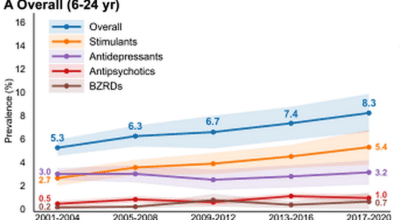
Study Finds Increasing Psychotropic Medication Use and Drug Interaction Risks in U.S. Youth
A DBEI-led study found rising psychotropic medication use among U.S. youth, along with growing safety concerns such as polypharmacy and potential drug–drug interactions.

PhD Student Julia DiTosto Co-Authors Study Linking Uterine Fibroids to Increased Cardiovascular Risk
A study co-authored by PhD student Julia DiTosto analyzed data from more than 2.7 million individuals and found that uterine fibroids may be associated with a significantly higher risk of cardiovascular disease.

Dr. Jeffrey Morris Clarifies How Vaccine Safety Is Monitored in the U.S.
Jeffrey S. Morris, PhD, analyzes the U.S. vaccine safety monitoring system and suggests improvements in a new APPC white paper.

How Evidence-Based Advocacy is Shaping FDA Drug Labels
In a recent interview, Dr. Sean Hennessy highlights how scientific evidence and advocacy can drive FDA label changes that expand access to safe, effective medications.
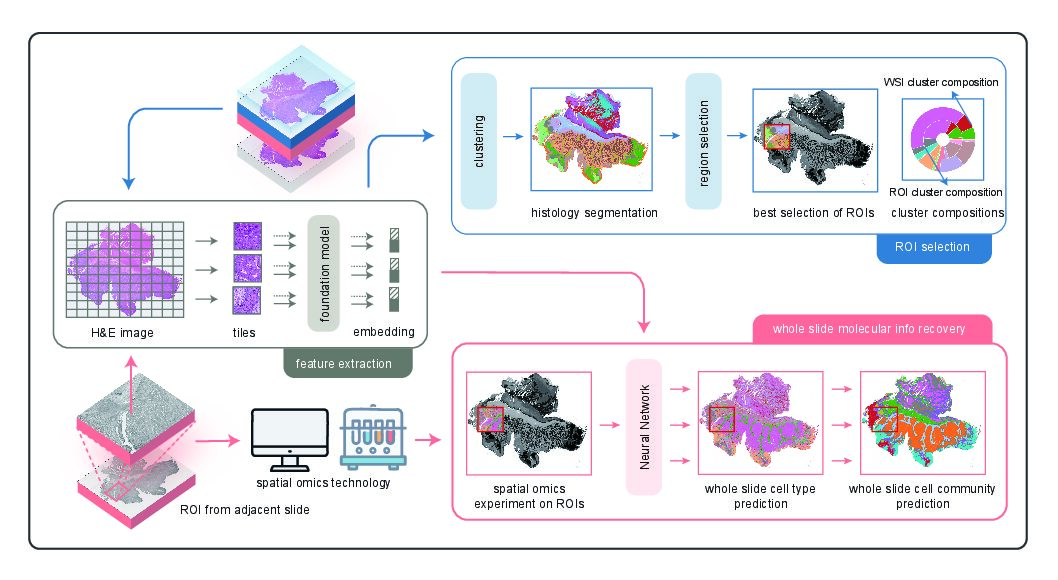
New Smart Spatial Omics Workflow Boosts Efficiency and Accuracy in ROI Selection
A new paper led by DBEI faculty member Mingyao Li, PhD, introduces smart spatial omics (S2-omics), an automated workflow that improves the rigor and reproducibility of spatial omics experiments.

New Study by Dr. Ricardo Castillo Finds Rabies Risk Concentrated in Disadvantaged Neighborhoods
A new study by Dr. Ricardo Castillo identifies stark rabies inequities in Arequipa driven by neighborhood socioeconomic status.
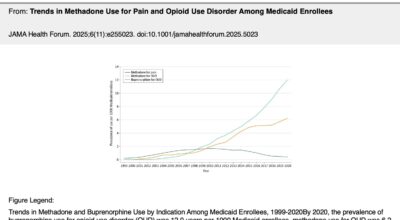
National Medicaid Study Shows Rising Use of Methadone and Buprenorphine for OUD
Penn researchers have received NIH/NIBIB funding to develop robust and interpretable multi-modal AI models that integrate genomics, imaging, and electronic health data to advance cancer and Alzheimer’s disease research.

Dr. Qi Long and Collaborators Awarded NIH R01 Grant to Advance Robust and Interpretable Multi-modal AI for Precision Medicine
Penn researchers have received NIH/NIBIB funding to develop robust and interpretable multi-modal AI models that integrate genomics, imaging, and electronic health data to advance cancer and Alzheimer’s disease research.

Jiancong Xiao, Weijie Su, and Qi Long Develop Innovative Strategy for Mitigating Algorithmic Bias in Modern AI Models
A new method helps prevent “preference collapse” in AI training, offering a fairer, more balanced approach to aligning large language models.

AI Tool RCANE Accurately Predicts Cancer Copy-Number Aberrations from RNA-Seq Data
Dr. Hongzhe Li’s team developed RCANE, an AI tool that predicts cancer copy-number aberrations from RNA-seq data, offering a faster, lower-cost alternative to DNA sequencing.

Drs. Xiang Li, Weijie Su, & Qi Long Propose a Novel Strategy for Robust Detection of AI-Generated Text
Penn researchers have developed an innovative approach for detecting AI-generated text that remains accurate even after human edits.

Dr. Qi Long and Collaborators Awarded NIH R01 Grant to Advance Neurosymbolic AI for Smart and Trustworthy Healthcare
Dr. Qi Long and collaborators have received NIH/NIBIB funding to advance neurosymbolic AI for smarter, more trustworthy healthcare.

Study Shows COVID-19 Reinfection More Than Doubles Long COVID Risk in Children
A new study in The Lancet Infectious Diseases shows that COVID-19 reinfection in children significantly increases the risk of long COVID and other serious health complications.

Dr. Hongzhe Li and Haoshu Xu Develop Novel Machine Learning Framework for Single-Cell Analysis
A new study by Dr. Hongzhe Li and AMCS PhD student Haoshu Xu introduces a machine learning framework that enables large-scale analysis of single-cell data, offering new insights into how gene co-expression networks shift with age.

Penn Researchers Develop Model to Predict Risk of Stimulant Overdose
Penn researchers developed a highly accurate model to predict who is most at risk of overdose from stimulants such as cocaine and methamphetamine—offering a promising tool to guide early intervention and prevention efforts.

New Study Explores Links Between BMI, Breast Density, and Breast Cancer Risk
Dr. Anne Marie McCarthy has co-authored a new article examining how body mass index (BMI) and breast density interact to influence breast cancer risk among Black and White women.

Bridging the Gap Between Theory and Practice in Implementation Science
Laura Ellen Ashcraft, PhD, MSW, introduces GUIDE—a new tool that turns complex implementation science theory into practical steps for early-career researchers.

A Seven-Step Framework for Strengthening Interdisciplinary Evaluation
LauraEllen Ashcraft and collaborators outline a seven-step framework in BMJ Open Quality to strengthen evaluation planning and interdisciplinary collaboration.
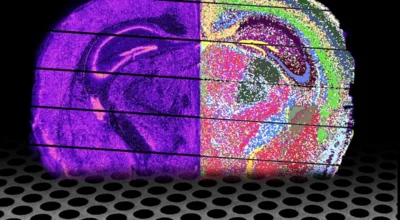
iSCALE Unlocks Molecular Maps of Large Human Tissues
Dr. Mingyao Li co-authored a study demonstrating iSCALE, a method that maps large human tissues at molecular and spatial resolution, uncovering disease features previously invisible.

Dr. Jordana Cohen Contributes to Updated National Hypertension Guidelines
Jordana Cohen, MD, MSCE, contributed to the 2025 AHA/ACC Hypertension Guideline–the first national update since 2017–introducing major changes in risk assessment, screening, and treatment. Her work was featured in an NPR interview highlighting these advances.

Dr. Samantha Piekos’ Study Shows Placental Biology Varies Across Pregnancy Complications
Dr. Samantha Piekos’ study shows how placental biology varies across pregnancy complications, highlighting the power of a systems biology approach to distinguish complex pregnancy syndromes.

Dr. Andrea Schneider Examines How Vascular Risks Impact Cognitive Recovery After Brain Injury
Dr. Andrea Schneider’s study finds that vascular risks, particularly diabetes, are linked to slower cognitive recovery after traumatic brain injury.

Dr. Mary Putt’s Study Reveals How Sleep Drive Influences Seizure Severity
Dr. Mary Putt and her team contributed to new research exploring how sleep drive impacts seizure severity and identifies a potential way to reduce them.

Ricardo Castillo Identifies Critical Gaps in Global Dog Rabies Vaccination
Ricardo Castillo’s new study identifies critical barriers to mass dog rabies vaccination campaigns and proposes strategies to eliminate dog-mediated human rabies by 2030.

Congratulations to Dr. Adam Naj on Receiving the Publication of the Year Award!
Congratulations to Dr. Adam Naj, honored with the Publication of the Year Award for a major study on PSP genetics published in Nature Communications.

New Publication by Dr. Danielle Mowery Explores How Patients Engage with Post-Discharge SMS
Dr. Danielle Mowery’s new study explores how patients engage with SMS systems after hospital discharge and what those patterns reveal about future care needs.

Sarah Schrauben Leads 7-Year Study Using Urine Biomarkers to Assess Kidney Disease Risk
Sarah Schrauben, MD, MSCE, led a 7-year study showing how urine biomarkers may help noninvasively track kidney disease in diabetic patients.

Journal of Human Hypertension Article Co-Authored by Dr. Jordana Cohen
A new study co-authored by Dr. Jordana Cohen explores the risks of white coat hypertension and emphasizes the importance of out-of-office blood pressure monitoring for accurate diagnosis and treatment.

Symptom-Based Clusters in Psoriatic Arthritis Reveal Different Treatment Responses
Dr. Alexis Ogdie co-authored a study published in the Annals of the Rheumatic Diseases that explores distinct patient groups and treatment responses in psoriatic arthritis.

What Matters Most: Treatment Goals from the Perspective of People Living with Psoriatic Arthritis
A new study in Arthritis Care & Research, co-authored by Dr. Alexis Ogdie, explores patient-defined treatment goals in psoriatic arthritis.

Dr. Alexis Ogdie Featured on Medscape’s InDiscussion Podcast
Dr. Alexis Ogdie joins Medscape’s InDiscussion podcast to talk about digital tools for psoriatic disease, including the development of the Psorcast app and the future of technology in rheumatology care.

Celebrating Dr. Joel M. Gelfand at the National Psoriasis Foundation Gala
Congratulations to Dr. Joel M. Gelfand on being honored with a gala celebrating his groundbreaking contributions to dermatology, epidemiology, and patient-centered research.

Dr. Alisa Stephens Shields’ JAMA Network Article
Congratulations to Dr. Alisa Stephens Shields on her recent JAMA Network Open publication evaluating the impact of COVID-19 self-test kit distribution in underserved communities.

Congratulations to Basam Alasaly on His Presentation at the AMIA Clinical Informatics Conference
Congratulations to Basam Alasaly, from Penn Medicine’s AI4AI Lab, for presenting at the AMIA 2025 Clinical Informatics Conference.

Dr. Mary Putt’s Publication in Physician’s Weekly
Congratulations to Dr. Mary E. Putt on her recent publication in Physician’s Weekly exploring how brain activity following electroconvulsive therapy (ECT) could hold new clues for improving treatment of severe, treatment-resistant depression.

Dr. Kevin B. Johnson’s REDCap Publication in The Scientist
Congratulations to Dr. Kevin B. Johnson on his publication in The Scientist highlighting the development and global impact of REDCap as a vital tool for clinical research data management.

Dr. Anne McCarthy’s Publication, “Radiomic Parenchymal Phenotypes of Breast Texture from Mammography and Association with Risk of Breast Cancer”
Congratulations to Dr. Anne Marie McCarthy on her recent publication in Radiology, highlighting how advanced imaging techniques can uncover subtle breast tissue patterns linked to cancer risk.

Dr. Rui Xiao’s Publication, “Zebrafishology, study design guidelines for rigorous and reproducible data using zebrafish”
Congratulations to Dr. Rui Xiao on her Nature publication offering new guidelines to support rigorous and reproducible research using zebrafish, a key model in biomedical science.

Dr. Mingyao Li’s Nature Publication, “Spatial Transcriptomics Reveals Human Cortical Layer and Area Specification”
Read about Dr. Mingyao Li's recent publication in Nature, which maps early human brain development using spatial transcriptomics. The study reveals that cortical layers and areas are specified earlier than previously thought, offering new insight into how the brain takes shape.

AIDS Article Authored by Penn Researchers, “Association of HIV status with infections complicating abortion in Botswana”
Penn researchers have published new findings in AIDS showing that HIV status may influence the risk of infection following abortion. The study focuses on patients in Botswana and underscores the importance of improving reproductive health care and equity for people with HIV.

Dr. Sean Hennessy’s Publication in the American Journal of Epidemiology
Read about Dr. Sean Hennessy's recent publication in the American Journal of Epidemiology, which uses a new statistical method to better understand the real-world effects of testosterone therapy. The study offers valuable insights into balancing its potential benefits and risks in clinical care.
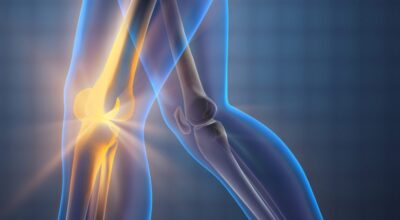
Dr. Joshua Baker’s Review, “Metabolic Consequences of Rheumatoid Arthritis”
Read about Dr. Joshua Baker's invited review explaining the connection between rheumatoid arthritis and metabolism, and how this link affects patient care amid new obesity treatments and improvements in arthritis management.

Dr. Jordana Cohen’s Editorial, “Rethinking Confirmatory Testing in Primary Aldosteronism”
Read about Dr. Jordana Cohen's editorial in Annals of Internal Medicine, where she highlights important considerations around diagnostic testing for primary aldosteronism and its impact on patient care.

Income Differences Explain Racial Disparities in IBD Care, Study Finds
A new study led by James Lewis, MD, MSCE, finds that racial and ethnic gaps in IBD care are closely tied to socioeconomic factors—highlighting the need for more equitable access to treatment and specialist care.

Visual Impairment, Age-Related Eye Disease, and Sleep Dysfunction in Older Adults
Sleep issues are common in older adults–but vision problems may be part of the cause. A new study by Alan Y. Huang, Joshua R. Ehrlich, and Ali G. Hamedani finds that those with visual impairments are more likely to use sleep medications, highlighting a connection between eye health and sleep quality.

Widespread Statistical Problems with Dietary Trials
Flawed study designs in nutrition research may be leading to misleading advice about healthy eating. DBEI’s Mary E. Putt, ScD, and co-authors warn that many popular dietary trials are too short and poorly structured to give reliable results-putting future nutrition guidelines at risk.

Electronic Nudges Improve End-of-Life Care Discussions in ICUs
Penn researchers, including Drs. Halpern and Harhay, found that electronic nudges improved end-of-life care discussions in ICUs, increasing hospice discharges and comfort-care orders without shortening hospital stays.

From Nudge to Habit: Penn Study Finds Lasting Gains in Seatbelt Use
Penn Medicine researchers, including M. Kit Delgado, MD, MS, found that small financial incentives using connected car data significantly increased seatbelt use—even after rewards ended—offering a low-cost, scalable strategy to improve driver safety nationwide.

AI ‘Scribe’ Reduces Clinician Workload, Improves Patient Interaction
Kevin B. Johnson, MD, MS, and Penn Medicine researchers conducted a study demonstrating how an AI-powered scribe technology reduces clinician workload, enhances patient interactions, and decreases after-hours documentation, improving efficiency and easing physician burnout.

Rising Temps, Rising Risks: How Climate Change Impacts Diabetes
Rising temperatures pose serious risks for people with type 2 diabetes, increasing the likelihood of heat exhaustion, blood sugar fluctuations, and cardiac issues. Charles Leonard, PharmD, MSCE, FISPE addresses these health threats with Yale Climate Connections.

New Report Examines the Risks of Co-Prescribing Opioids and Benzodiazepines to Veterans
A new National Academies of Sciences, Engineering, and Medicine (NASEM) report, involving DBEI experts Brian Strom, MD, MPH and John Farrar, MD, PhD, finds that co-prescribing opioids and benzodiazepines to veterans increases the risk of death, highlighting critical implications for veteran health care.

Using AI to Uncover Hospital Patients’ Long COVID Care Needs
In a new study, Yong Chen, PhD and colleagues at Penn Medicine, used AI and latent transfer learning to analyze long-COVID data, identifying four patient sub-populations with distinct care needs, improving hospital resource allocation and tailoring treatment for diverse patient populations.

AI Tool Analyzes 30K Data Points Per Medical Imaging Pixel in Cancer Search
Mingyao Li, PhD and her Penn Medicine colleagues developed an AI-powered tool called MISO (Multi-modal Spatial Omics) that can detect cell-level characteristics of cancer by looking at data from extremely small pieces of tissue—some as small as the width of five human hairs.

New Framework for Health Policy Evaluation: Target Trial Emulation Enhances Accuracy in Nonexperimental Studies
In Annals of Internal Medicine, Nicholas Seewald, PhD, introduces a framework for target trial emulation, enabling researchers to evaluate health policies with the rigor of clinical trials in nonexperimental studies.

Dr. Michael Harhay Highlights the Growing Impact of Bayesian Statistics on Clinical Research
Michael Harhay, PhD, MPH, co-authors "Bayesian Statistics for Clinical Research" in The Lancet, comparing Bayesian and frequentist methods and highlighting the growing accessibility and impact of Bayesian analysis in medical research.

Dr. Mingyao Li Explores the Transformative Role of AI in Spatial Omics Research in Nature Methods
Dr. Mingyao Li's article in Nature Methods discusses how artificial intelligence is revolutionizing spatial omics, enhancing integration of diverse data and accelerating biological discoveries for improved health outcomes in biomedical research.

Penn Medicine Study Shows High Pregnancy Weight Gain Tied to Higher Risk of Death in the Following Decades
Excess weight gain during pregnancy increases long-term death risk from heart disease and diabetes, a Penn Medicine study finds, highlighting the need for better prenatal weight management and preventive care.
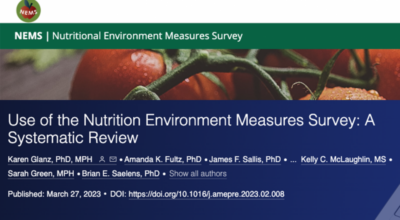
A comprehensive review covers 15 years of nutrition environment measurement tools
NEMS measures have played an important role in the growth of research on food environments and have helped researchers to explore the relationships among healthy food availability, demographic variables, eating […]

Pregnancy Complications Tied to Higher Risk of Death As Long As 50 Years Later
Pregnancy complications like preterm birth and high blood pressure increase long-term death risk, a Penn Medicine study finds, highlighting the need for preventive care decades after childbirth.

False Alarm? Critical Antibiotic Combination Used for Millions of Patients May Not Carry a Previously Reported Risk
Patients come to a hospital nearly 36 million times each year in the US, and antibiotics are often part of the picture: One large study showed that clinicians prescribed them […]

Making the EHR Into a Benefit, Not a Burden
In 1991, the National Academies of Sciences, Engineering and Medicine declared that computer-based patient records were an essential technology for health care. The new records would not only support patient […]

Innovative Text Messaging Plus a Nursing Team: Dramatic Covid Results Hint at Broader, Equitable Potential
At the start of the pandemic, professionals working in health systems across the US realized that if a sizable portion of the many people infected with SARS-CoV-2 went to hospitals, […]
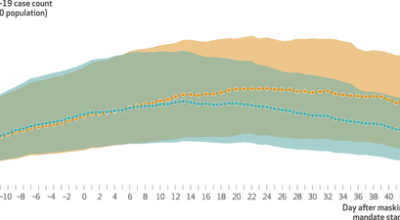
Masking Policies for Covid-19: What Does the Science Say?
Masking policies during Covid-19 have inspired plenty of political debate, but scientific evidence about the policies’ effects has been very limited. This isn’t surprising, given that it is not practical […]

New in JNCI: Pandemic not associated with treatment initiation delays for patients with advanced cancer
Rebecca Hubbard, PhD, co-led a new JNCI paper that studied >14k patients with advanced cancer in a national EHR database to show that time from diagnosis to treatment and choice of therapy […]
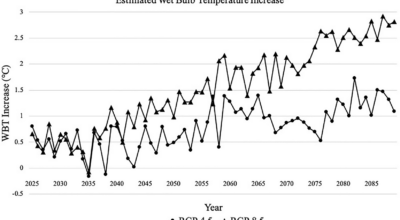
With Climate Change, More Cases of Kidney Stones
In addition to making events such as catastrophic flooding more frequent, climate change will negatively affect human health in many other ways. Prior research has demonstrated, for instance, that high […]

The Delicate Balance of Pregnancy Research
“Pregnant women CAN drink coffee – it could even slash risk of disease for mum and baby,” proclaimed a headline in the English paper The Sun about a recent study […]

Moderate Amounts of Caffeine Not Linked to Maternal Health Risks
Low to moderate caffeine intake during pregnancy may lower gestational diabetes risk without increasing risks for preeclampsia or hypertension, a Penn Medicine study finds, offering reassurance to pregnant coffee drinkers.

New at NeurIPS 2021: Assessing Fairness in the Presence of Missing Data
Our new paper “Assessing Fairness in the Presence of Missing Data” has been accepted for publication at NeurIPS 2021, a leading machine learning /artificial intelligence conference. Learn More

New in PNAS: Minority collapse in deep learning, unfairness for minority groups in high-stakes decisionmaking
Our recent PNAS paper introduced the Layer-Peeled Model in deep learning that can: 1) predict a hitherto unknown phenomenon termed “Minority Collapse” in imbalanced training; and 2) explain neural collapse […]

New in JAMA: Some Cancer Patients More Likely to Receive Immunotherapy, Despite Lack of Benefits
Rebecca Hubbard, PhD, and Qi Long, PhD, are co-authors on this new JAMA Oncology paper that finds solid-tumor cancer patients ineligible for clinical trials receive immunotherapy at greater rates — […]

Leveraging machine learning predictive biomarkers to augment the statistical power of clinical trials with baseline magnetic resonance imaging
A key factor in designing randomized clinical trials is the sample size required to achieve a particular level of power to detect the benefit of a treatment. Sample size calculations […]
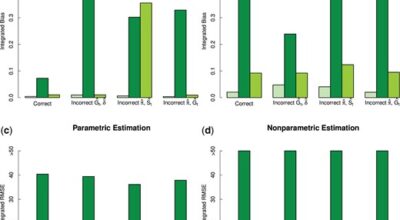
New Working Paper on Nonparametric Instrumental Variable Estimators
Doubly robust nonparametric instrumental variable estimators for survival outcomes Youjin Lee, Edward H Kennedy, Nandita Mitra Instrumental variable (IV) methods allow us the opportunity to address unmeasured confounding in causal […]
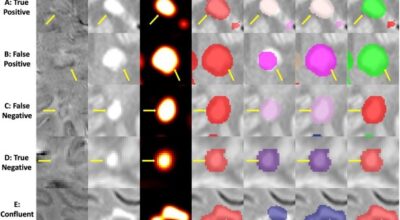
Fully Automated Detection of Paramagnetic Rims in Multiple Sclerosis Lesions on 3T Susceptibility-Based MR Imaging
The presence of a paramagnetic rim around a white matter lesion has recently been shown to be a hallmark of a particular pathological type of multiple sclerosis lesion. Increased prevalence […]

Removal of Scanner Effects in Covariance Improves Multivariate Pattern Analysis in Neuroimaging Data
To acquire larger samples for answering complex questions in neuroscience, researchers have increasingly turned to multi-site neuroimaging studies. However, these studies are hindered by differences in images acquired across multiple […]
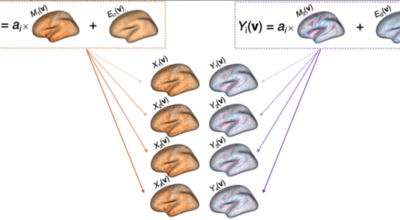
A simple permutation-based test of intermodal correspondence
While many findings in neuroimaging studies pertain to multiple imaging modalities, statistical methods underlying intermodal comparisons have varied. In our recently published paper in Human Brain Mapping, we propose the […]

Turning the Tables on Diseases that Spread Spatially
Many human diseases start out with single cells, which establish the problem by spreading out. Spatial transcriptomics, a groundbreaking method, allows scientists to take advantage of that activity, measuring all […]
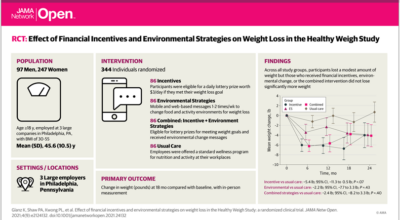
Achieving a Healthy Weight: More Intensive and Tailored Individual Strategies May Be Best
Given rising rates of obesity in the U.S. and the many associated health problems, researchers have tested various strategies for weight loss. Both financial incentives and environmental changes — such […]
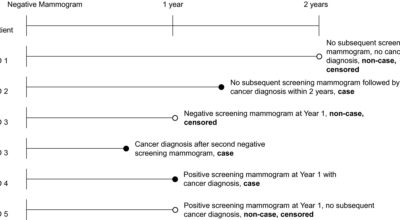
Breast Cancer Diagnosis in the ‘Between’ Year: Body Mass Index Matters
Although mammography reduces breast cancer mortality by 15 to 20 percent, the diagnosis in many cases — approximately 15 percent of all breast cancers — occurs after a patient has […]
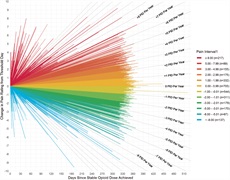
Patients with Chronic Non-Cancer Pain: Adding to the Options for Relief
While many studies have looked at how to limit patients to a short course of opioids, few have examined the other side of the issue: Are there some patients for […]

New Working Paper on Job Vacancies and Immigration
Job Vacancies and Immigration: Evidence from the Mariel Supply Shock L. Jason Anastasopoulos, George J. Borjas, Gavin G. Cook, and Michael Lachanski We use the Conference Board’s Help-Wanted Index (HWI) […]

New Working Paper on Unmeasured Confounding and Time
Controlling for Unmeasured Confounding in the Presence of Time: Instrumental Variable for Trend Ting Ye, Ashkan Ertefaie, James Flory, Sean Hennessy, Dylan S. Small Unmeasured confounding is a key threat […]

New Working Paper on Bayesian Nonparametric Cost-Effectiveness Analyses
Bayesian Nonparametric Cost-Effectiveness Analyses: Causal Estimation and Adaptive Subgroup Discovery Arman Oganisian, Nandita Mitra, Jason Roy Cost-effectiveness analyses (CEAs) are at the center of health economic decision making. While these […]

Discussion on the Evaluation of Mobile Health Interventions
Moving Toward Rigorous Evaluation of Mobile Health Interventions Kristin A. Linn Qian, Klasnja and Murphy provide an assumption that allows for unbiased estimation of treatment effects in microrandomized trials when […]
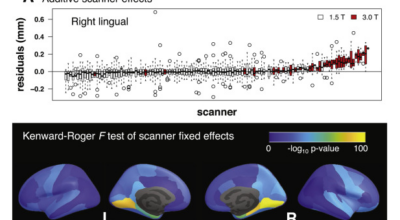
Longitudinal ComBat: A method for harmonizing longitudinal multi-scanner imaging data
While aggregation of neuroimaging datasets from multiple sites and scanners can yield increased statistical power, it also presents challenges due to systematic scanner effects. This unwanted technical variability can introduce […]

The CDC evidence review to improve school nutrition
School administrators and public health officials are important players in the choices our children make during meals at school. This evidence review of environmental and policy strategies to improve school […]
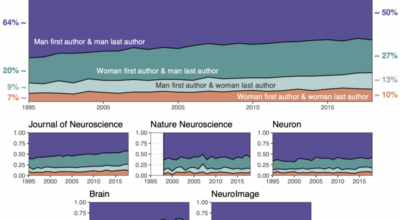
The extent and drivers of gender imbalance in neuroscience reference lists
Like many scientific disciplines, neuroscience has increasingly attempted to confront pervasive gender imbalances within the field. While much of the conversation has centered around publishing and conference participation, recent research […]
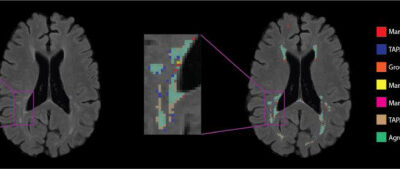
Automatic Threshold Detection for Classification of Lesions
Total brain white matter lesion volume is the most widely established MRI outcome measure in studies of multiple sclerosis. To estimate white matter lesion volume, there are a number of […]

New Working Paper on a non‐parametric projection‐based estimator for the probability of causation
A non‐parametric projection‐based estimator for the probability of causation, with application to water sanitation in Kenya Maria Cuellar and Edward H. Kennedy Current estimation methods for the probability of causation […]
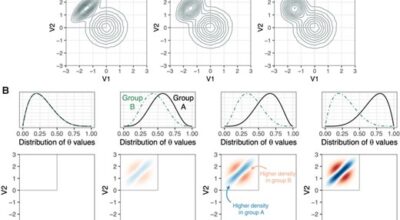
A local group differences test for subject-level multivariate density neuroimaging outcomes
A great deal of neuroimaging research focuses on voxel-wise analysis or segmentation of damaged tissue, yet many diseases are characterized by diffuse or non-regional neuropathology. In simple cases, these processes […]
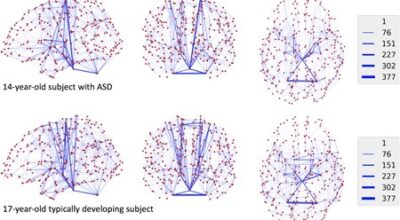
Distance-Based Analysis of Variance for Brain Connectivity
The field of neuroimaging dedicated to mapping connections in the brain is increasingly being recognized as key for understanding neurodevelopment and pathology. Networks of these connections are quantitatively represented using […]
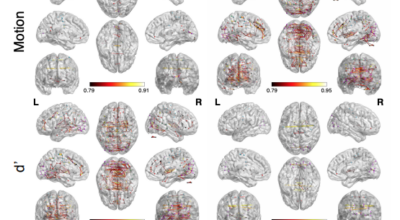
Robust Spatial Extent Inference with a Semiparametric Bootstrap Joint Inference Procedure
Spatial extent inference (SEI) is widely used across neuroimaging modalities to adjust for multiple comparisons when studying brain-phenotype associations that inform our understanding of disease. Recent studies have shown that […]

New working paper on causal inference with zero-inflated outcomes
A Bayesian Nonparametric Model for Zero-Inflated Outcomes: Prediction, Clustering, and Causal Estimation Arman Oganisian, Nandita Mitra, and Jason Roy Researchers are often interested in predicting outcomes, conducting clustering analysis to […]

New working paper on longitudinal mediation
Bayesian Longitudinal Causal Inference in the Analysis of the Public Health Impact of Pollutant Emissions Chanmin Kim, Corwin M Zigler, Michael J Daniels, Christine Choirat, and Jason A Roy Pollutant […]

New working paper on differences-in-differences
Patterns of Effects and Sensitivity Analysis for Differences-in-Differences Luke J. Keele, Dylan S. Small, Jesse Y. Hsu, and Colin B. Fogarty Applied analysts often use the differences-in-differences (DID) method to […]

New paper on continuous instrumental variables
Robust causal inference with continuous instruments using the local instrumental variable curve Edward H. Kennedy, Scott Lorch, and Dylan S. Small Instrumental variables are commonly used to estimate effects of […]
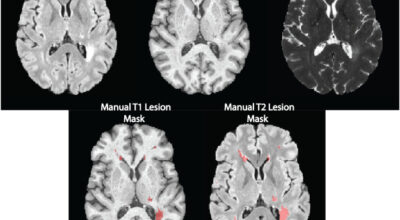
Detecting Black Holes in Multiple Sclerosis
Magnetic resonance imaging (MRI) is crucial for in vivo detection and characterization of white matter lesions (WML) in multiple sclerosis (MS). The most widely established MRI outcome measure is the […]
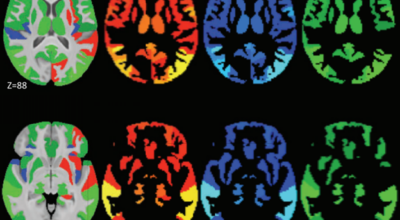
Faster family-wise error control for neuroimaging with a parametric bootstrap
In neuroimaging, hundreds to hundreds of thousands of tests are performed across a set of brain regions or all locations in an image. Recent studies have shown that the most […]